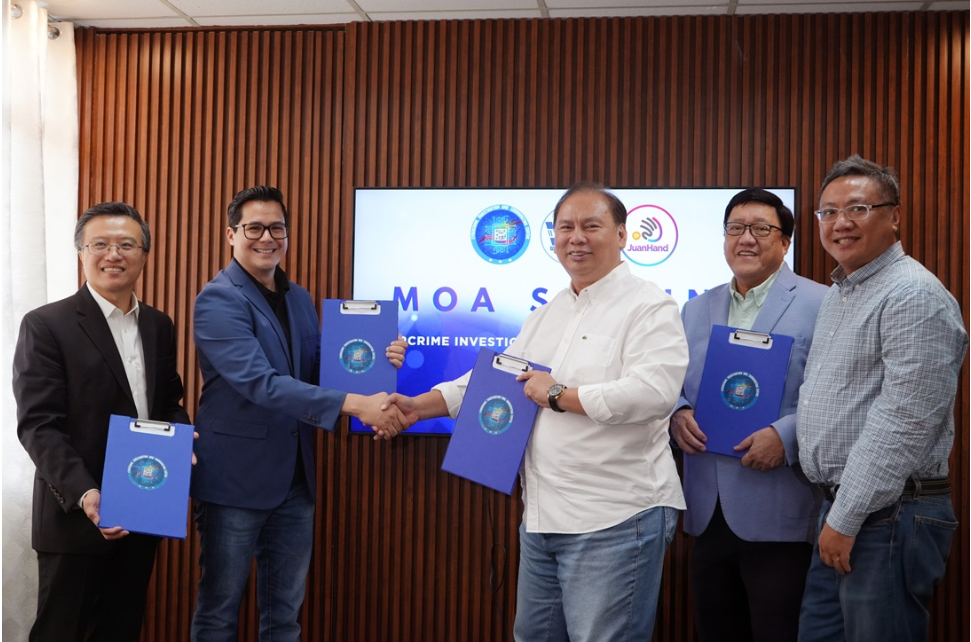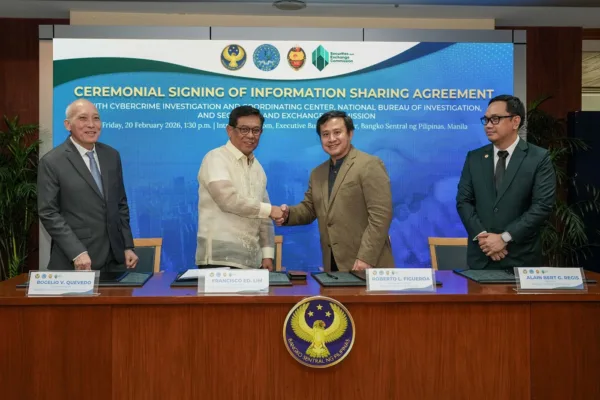JuanHand, an online lending platform, and the Philippines’ Cybercrime Investigation and Coordinating Center (CICC) have recently signed a groundbreaking memorandum of agreement (MOA) aimed at combating cybercrime and fraud within the fintech lending sector.

Officials from JuanHand led by President and CEO Francisco “Coco” Mauricio (2nd from left) and FinVolution Group’s Head of International Business Xiaodong Sun join CICC representatives headed by Executive Director Undersecretary Alexander Ramos and Director Alvin Navarro, during the MOA-signing
This collaboration, which was formalized late last month year at the National Cybercrime Hub in Taguig City, signifies a major step forward in safeguarding digital financial transactions and strengthening consumer protection.
Under the MOA, CICC and JuanHand will develop a robust data and information-sharing mechanism. This system aims to enhance cybercrime detection, improve cybersecurity capabilities, and accelerate digitalization initiatives within the fintech lending space.
The initiative is a first for the CICC, which plans to expand its partnerships with additional fintech companies soon, addressing the rising need for secure online lending practices.
JuanHand, CICC to help address challenges faced by digital borrowers
At the signing event, Alexander Ramos, CICC’s executive director and undersecretary, highlighted the increasing challenges faced by digital borrowers in the Philippines, who are often targeted by unregistered and predatory lenders.

During the event, Ramos emphasized the importance of guiding vulnerable consumers towards trustworthy, registered lending platforms. “There are a lot of victims who are being harassed by unscrupulous online platforms who are not even registered. And these are the concerns that we’d like to address,” he said in a press release.
Ramos also detailed the difficulties many borrowers face, where seemingly minor loans quickly spiral into significant debts due to exorbitant interest rates. “We would like to help them by directing them to registered platforms, ensuring they don’t fall victim to just any application offering financial services,” Ramos stated. He cited cases in which individuals borrowed as little as PHP20,000 (around US$343) but were left repaying over PHP100,000 (US$1,715) due to predatory terms.
“That’s too much. Too predatory,” he added, underscoring the importance of legitimate platforms that promote ethical lending.
For his part, Coco Mauricio, President and CEO of JuanHand, also spoke on the need to foster a trustworthy lending environment for the Filipino public. “The last thing we want is to make the borrowing public or the underserved uncomfortable with online lending,” Mauricio said. “Because if they’re uncomfortable, where would they go? Loan sharks, ‘five-six’? Those would expose them to deeper debt and worse harassment.” He highlighted JuanHand’s commitment to fair lending, which aims to support rather than exploit borrowers.

JuanHand currently offers microloans up to PHP50,000, which are payable over periods of up to nine months at interest rates under 0.49% per day. The platform’s loan products cater primarily to underserved populations in the Philippines, providing an alternative to traditional and informal lending practices.
This partnership with CICC will further bolster the platform’s security measures, protecting its users from fraud and ensuring their transactions are safeguarded from cyber threats.
Based on lending solutions provider Digido’s analysis, Filipinos have collectively dedicated approximately 1.3 billion seconds — or 42 years — to digital lending applications in 2023. This staggering statistic underscores the significant shift towards digital lending solutions in the country.
Partnership to bring a sense of assurance to online lending platforms
The signing of the MOA reflects a growing trend in the Philippines to foster a safer digital finance ecosystem. The CICC has identified fintech partnerships as a critical strategy for addressing the increasing threat of cybercrime, particularly as online transactions become the norm. By aligning with JuanHand, the CICC is taking a proactive stance on addressing the cybersecurity challenges facing both consumers and fintech companies.
Moving forward, the CICC aims to onboard more fintech platforms to join the initiative, creating a network of compliant, cyber-secure financial service providers. This approach will allow for a streamlined, centralized method of tracking and addressing cyber threats across the sector, reducing the risk of fraud, harassment, and predatory practices.
For many Filipinos who rely on online lending platforms like JuanHand, this partnership brings a sense of assurance. It is a promising development in a country where the financial inclusion gap remains significant, with many citizens relying on alternative lending solutions for their financial needs.
The CICC and JuanHand’s alliance is thus a strategic move to empower borrowers, protect them from exploitation, and encourage responsible borrowing practices within a safe, regulated digital landscape.
The MOA’s impact on the fintech lending space will be closely watched, as it marks a pioneering step in cybersecurity collaboration between the Philippine government and the private sector. As more fintech companies follow JuanHand’s lead, this partnership could set a new standard for responsible, secure digital lending in the Philippines.







